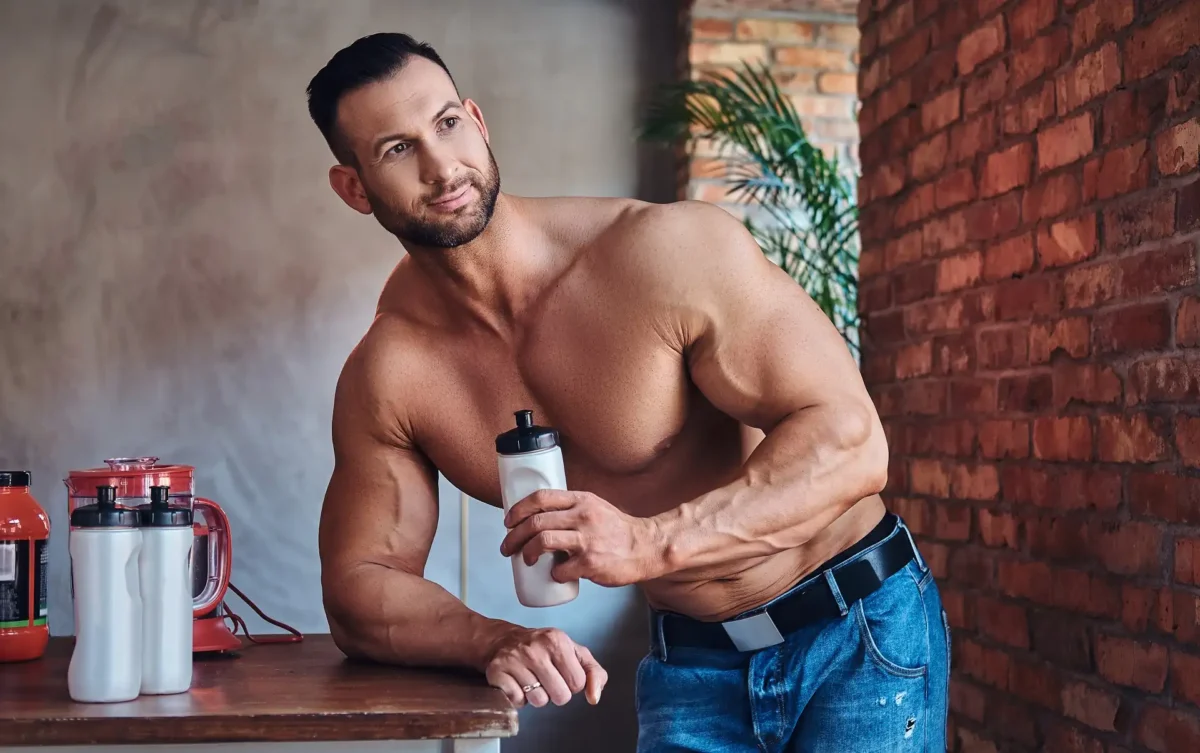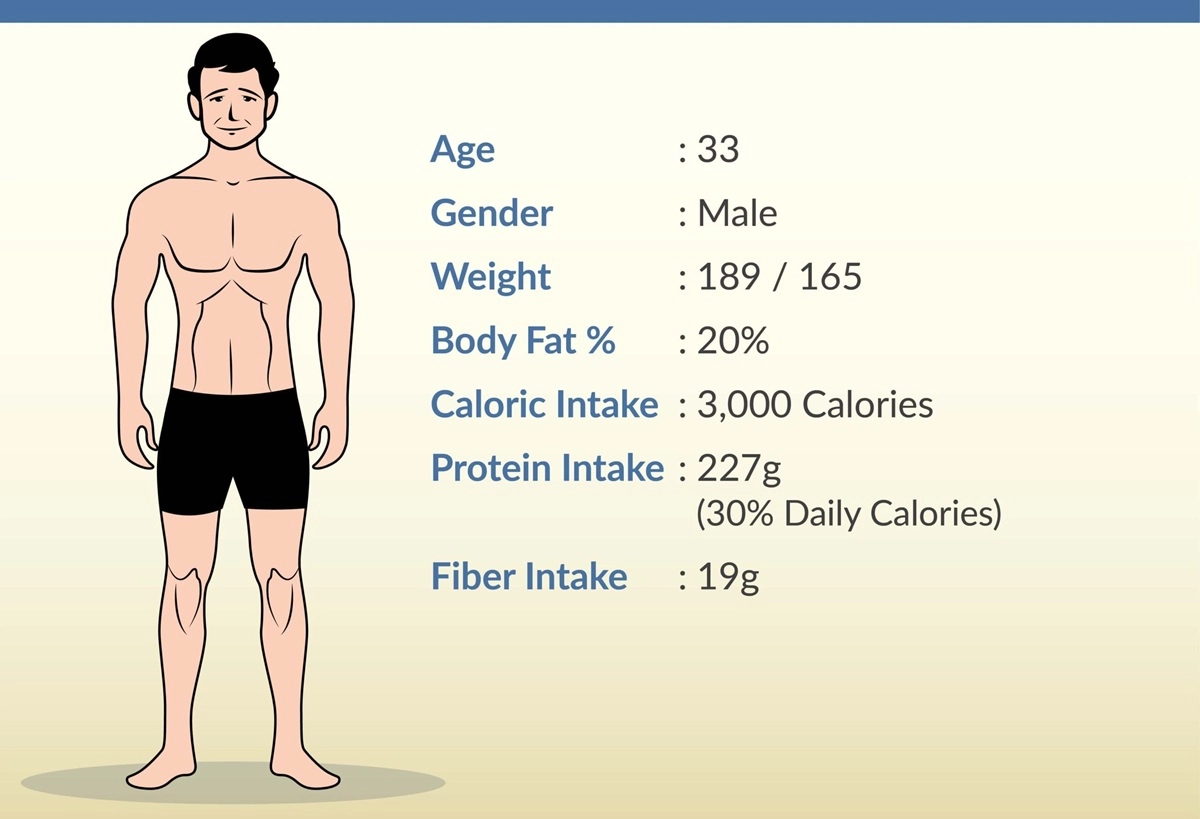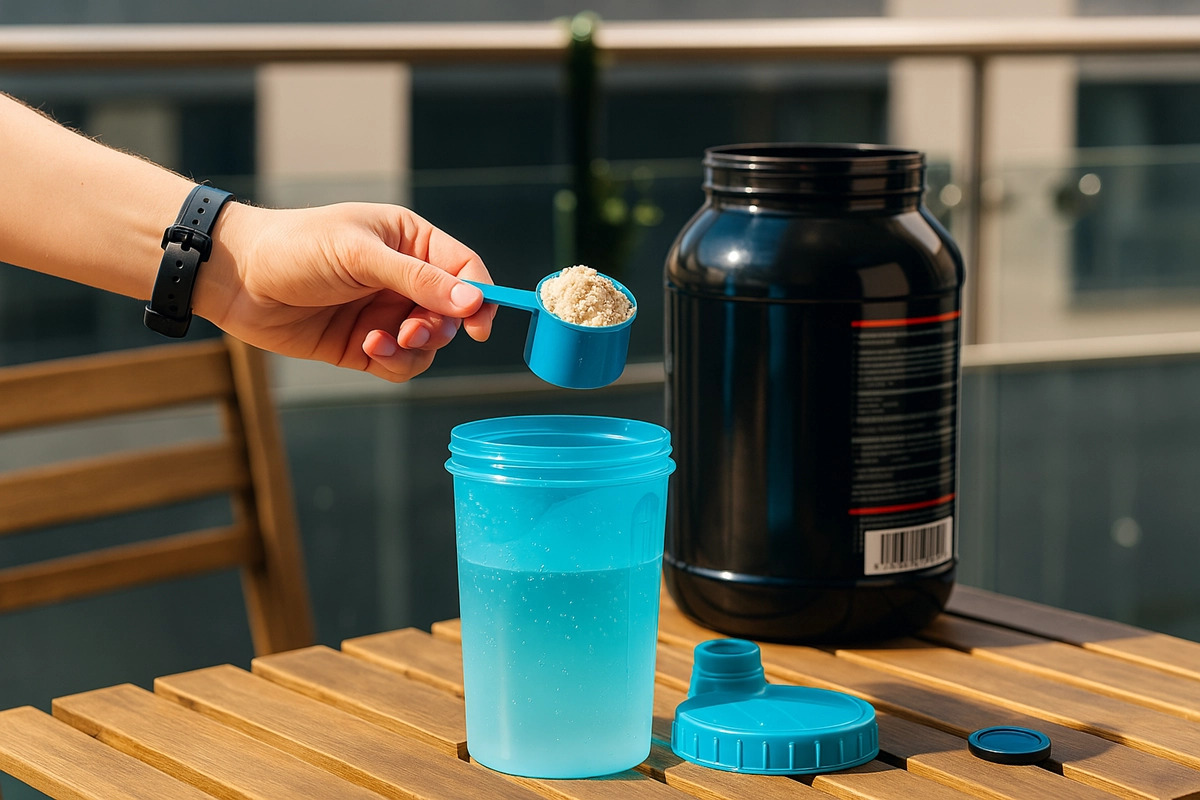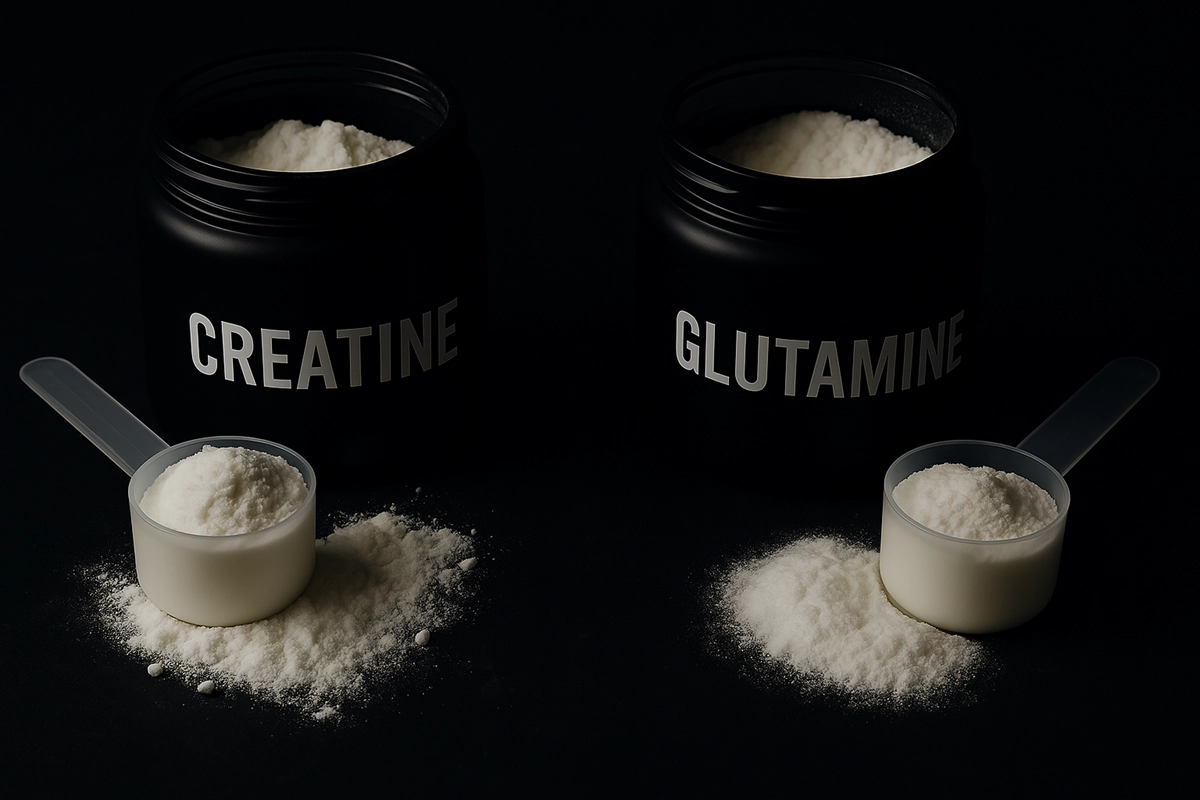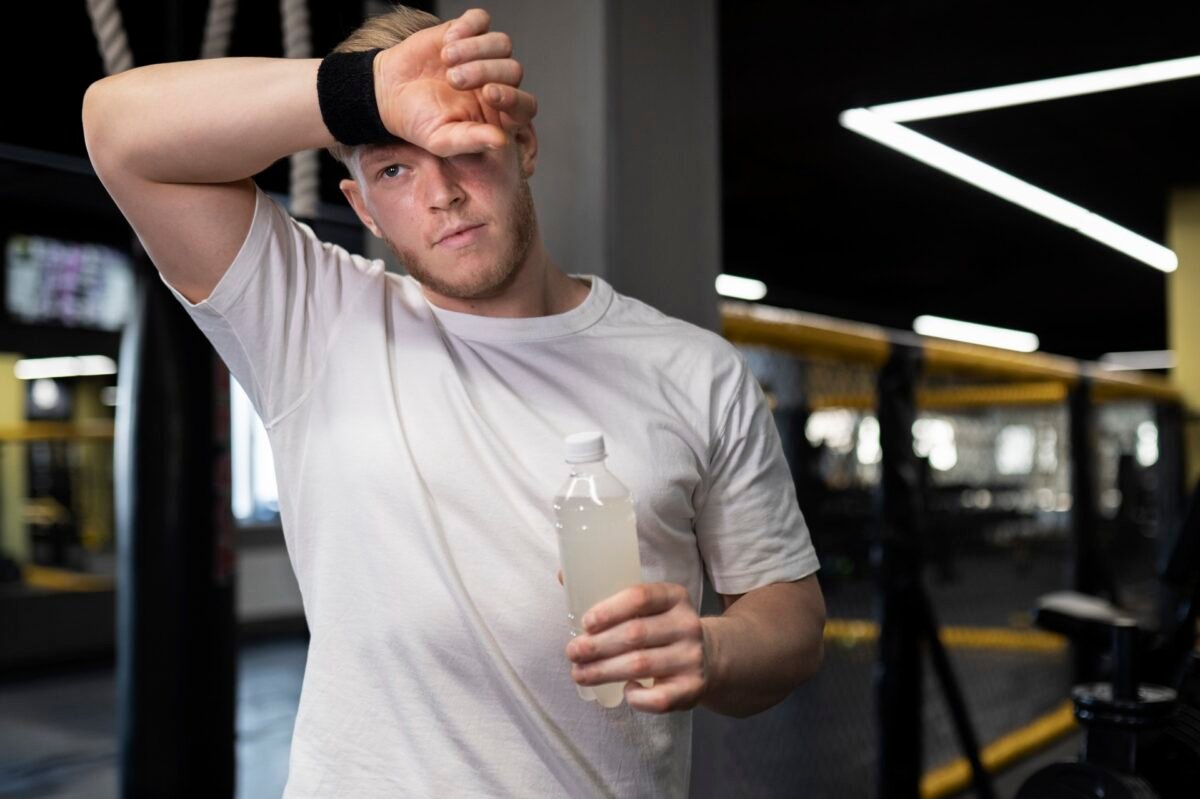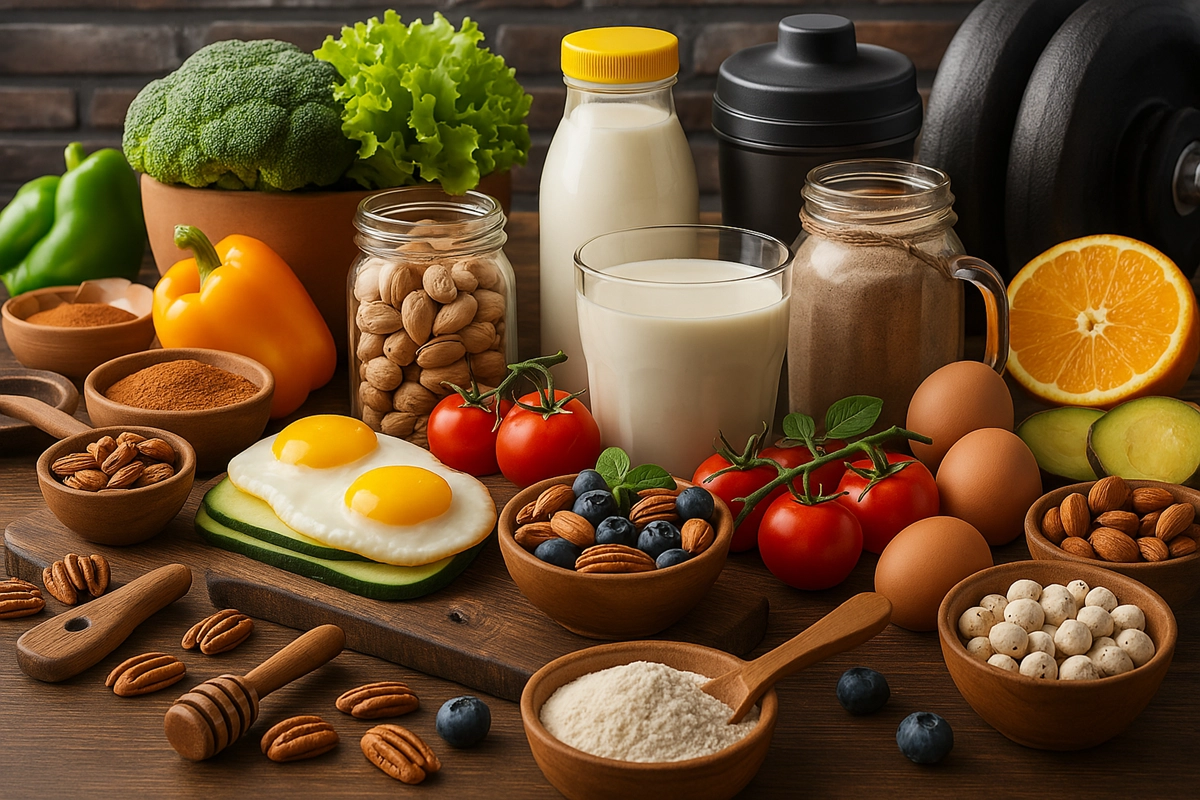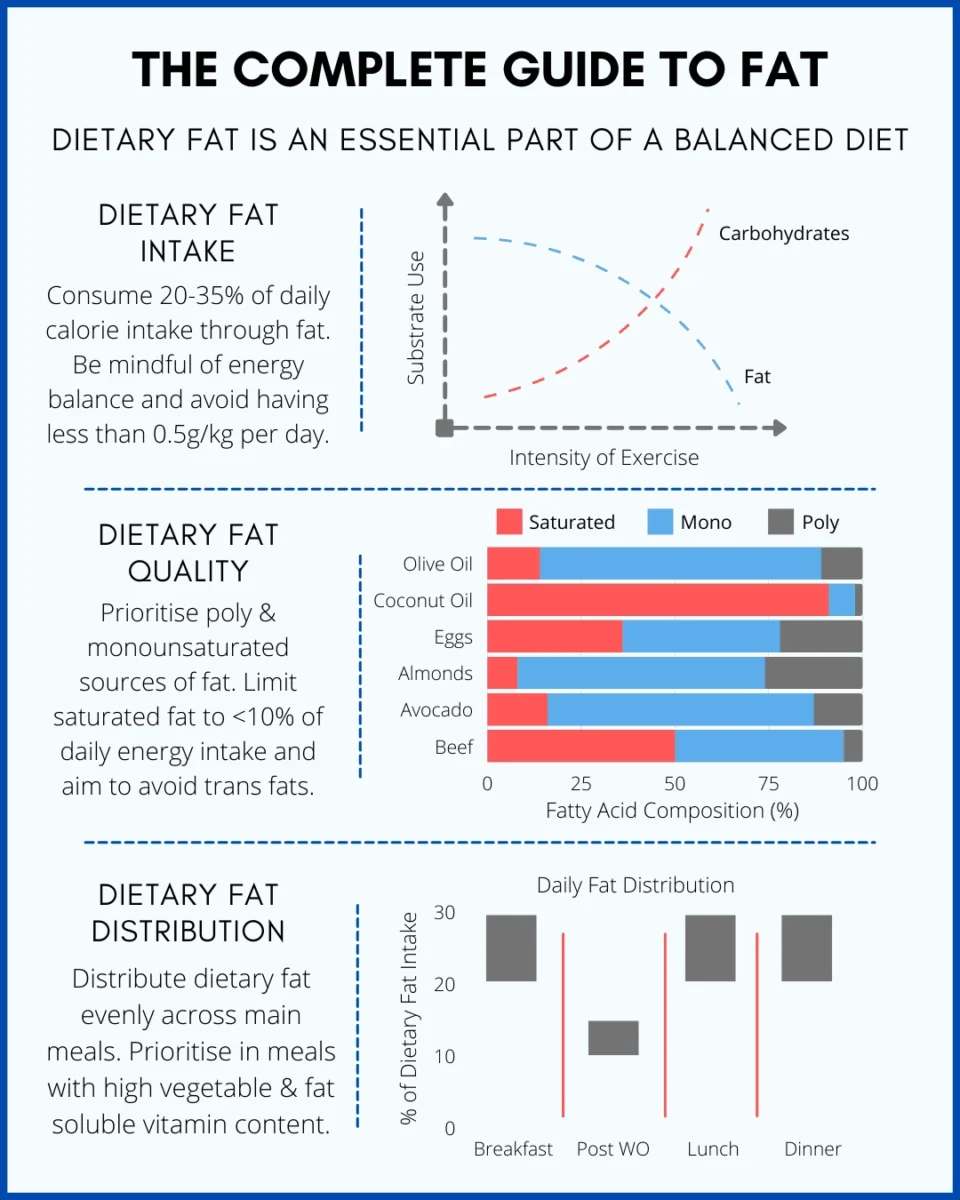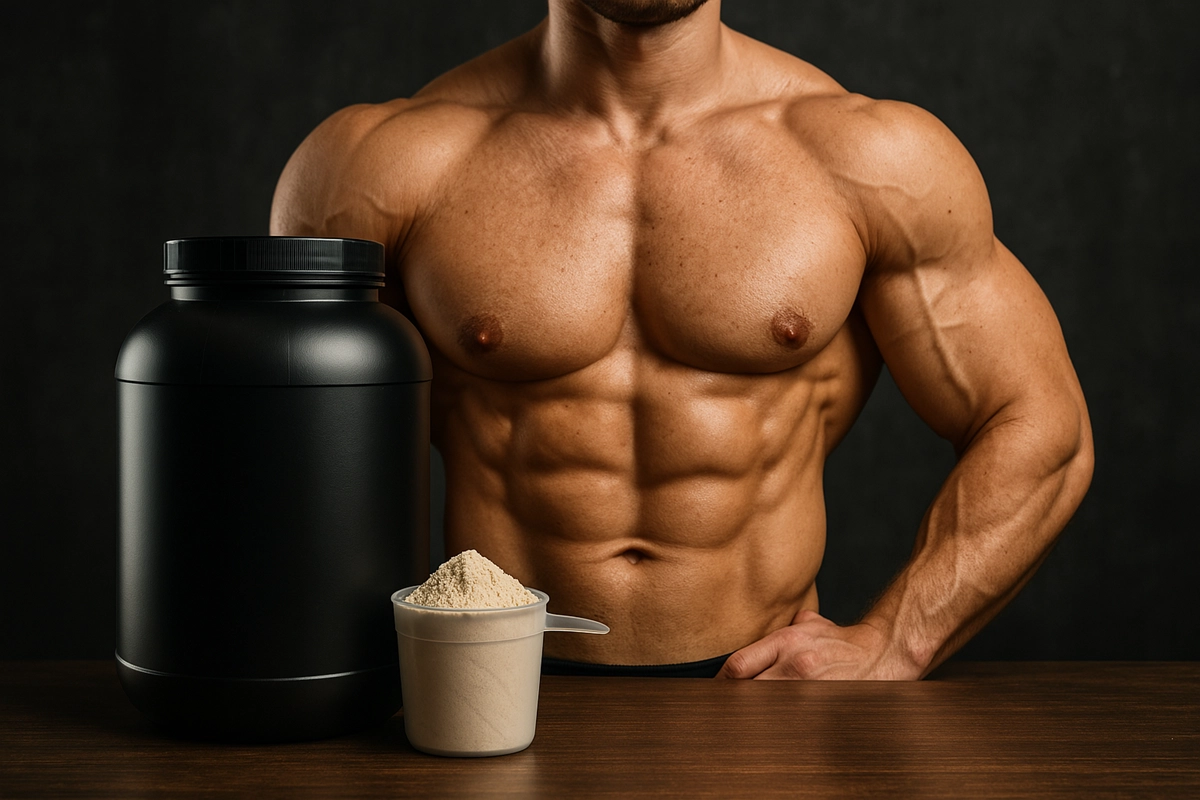Just as Arnold Schwarzenegger transformed from a lean Austrian teen into Mr. Olympia through strategic supplementation, you too can optimize your gains with the right nutritional tools.
You’ll find that supplements aren’t magic pills, but rather powerful allies in your muscle-building journey when used correctly.
Before you spend your hard-earned money on flashy products, let’s cut through the marketing hype and examine which supplements actually deliver results based on scientific evidence.
1. Creatine Monohydrate
If you’re a woman looking to maximize your muscle gains, you’ll be glad to know that creatine monohydrate works just as effectively for females as it does for males.
Research shows female athletes can expect similar strength improvements and lean mass increases when following recommended creatine protocols.
While some women worry about water retention, the minimal fluid gains from creatine supplementation actually help support muscle growth and recovery without causing unwanted bulk.
Creatine Monohydrate Supplementation In Females
Understanding creatine supplementation for women requires recognizing key biological differences between males and females.
Women naturally have 70-80% lower creatine stores and metabolize it differently due to their unique hormonal profile.
Female athletes can notably benefit from creatine monohydrate supplementation, especially during hormonal changes like menstruation, pregnancy, and menopause.
When combined with resistance training, you’ll experience improved muscle growth, strength gains, and enhanced exercise performance.
Research also shows positive effects on bone density, mood, cognition, and sleep quality.
You can follow the same dosing protocols recommended for men, but it’s essential to consult your doctor before starting supplementation.
They’ll help determine the right dosage based on your health history and confirm there are no interactions with current medications you’re taking.
2. Caffeine
Fitness enthusiasts have long relied on caffeine as their go-to pre-workout supplement, and science backs up its popularity.
As a proven ergogenic aid, caffeine shines particularly bright in endurance and high-intensity activities, though its effects on muscle strength are less definitive.
While some studies show caffeine can boost your bench press one-rep max, others haven’t found significant strength improvements during resistance exercise.
However, don’t write off this performance-enhancing supplement just yet. You’ll likely notice reduced fatigue and a lower perceived effort during your workouts, which can help you push through those challenging, high-volume training sessions.
For best results, take 150-300mg of caffeine 30-60 minutes before training. As Arnold would say, “The mind is the limit,” and caffeine might just help you break through those mental barriers.
3. Citrulline Malate
When it comes to pushing past your training plateau, citrulline malate might be your secret weapon.
This powerhouse supplement, originally used to combat fatigue in post-surgery patients, has evolved into a go-to choice for serious lifters seeking increased strength and muscle gain.
Research shows that taking 8 grams of citrulline malate 60 minutes before your exercise routine can greatly boost your performance.
You’ll be able to pump out more reps in both upper and lower body workouts, while experiencing less muscle soreness afterward.
This supplement works by enhancing ATP production during your lifts and improving recovery between sets.
Think of it as your workout amplifier – it helps you push harder, train longer, and recover faster. For best results, combine it with proper protein synthesis support through nutrition and rest.
4. No Boosters
Looking to supercharge your muscle gains naturally? Nitrate-rich foods can be your secret weapon for boosting nitric oxide production and enhancing muscle performance. Foods like beets, radishes, and pomegranates are proven NO boosters that can increase blood flow to your muscles during resistance training.
While research is still emerging, studies have shown promising results when using beet root juice and pomegranate extract in performance supplements. These ingredients may help reduce muscle soreness and improve strength gains, especially when combined with other supplements.
To maximize benefits, take 500mg of beet root juice or pomegranate extract 30-60 minutes before hitting the weights. Though more research is needed to fully understand their individual effects, these natural NO boosters could be the edge you need to push through plateaus and achieve new gains.
5. Whey Protein Supplements
Among all muscle-building supplements, whey protein stands as the undisputed champion for maximizing your gains. Your body craves fast-digesting protein after intense workouts, and whey delivers exactly what your muscles need for peak recovery and growth.
When you combine whey with slow-digesting casein, you’ll create an extended anabolic environment that keeps muscle protein synthesis firing while minimizing breakdown.
You’ll want to aim for 20-30 grams of protein post workout, ideally mixed with high-glycemic carbs to spike insulin and enhance recovery. If you’re training like Arnold did – with high volume and intensity – this combo becomes even more vital for your results.
Don’t worry if you can’t get enough protein through food alone. Quality protein supplements can effectively bridge the gap, especially if you’re targeting 0.6-0.9 grams per pound of bodyweight daily.
6. Glutamine
Though glutamine doesn’t pack the same muscle-building punch as whey protein, this amino acid serves as your secret weapon for enhanced recovery and immune function.
When you’re pushing through intense training sessions, your body accumulates ammonia, which can hinder recovery and muscle repair. Glutamine steps in to regulate your body’s acid-base balance by removing excess ammonia, helping you bounce back faster between workouts.
You’ll particularly benefit from glutamine supplementation if you’re training twice daily, lifting heavy, or cutting calories. Think of it as your recovery insurance policy – it won’t directly build muscle, but it’ll help protect your gains.
Dosage recommendations:
- Daily intake: 20-30 grams
- Post-workout: 10 grams
- Timing: Take immediately after training for best results
7. Fish Oils
When your muscles scream from yesterday’s workout, fish oils might be your best ally in the recovery battle. As a strength athlete, you’ll benefit from the omega-3 fatty acids that help combat excessive inflammation from those intense training sessions.
These powerful compounds work to reduce muscle soreness and accelerate your recovery time, getting you back to crushing weights sooner.
What’s even more impressive is how fish oils can boost your gains when combined with BCAAs and carbs. They’re proven to enhance protein synthesis, helping you build more muscle mass efficiently.
Think of it as adding high-octane fuel to your body’s muscle-building engine. For ideal results, you’ll want to take 2 grams daily with a meal, making it as routine as Arnold’s famous “milk is for babies” protein shake.
8. Weight Gainers
Now that you’ve mastered the art of recovery with fish oils, let’s power up your muscle-building potential with weight gainers.
These calorie-dense muscle-building supplements pack a powerful punch, delivering anywhere from 1,000 to 1,500 calories per serving.
While many assume weight gainer supplements are primarily protein powder, they’re actually loaded with carbs – containing 75-300g per serving, alongside 20-60g of protein.
Research shows mixed results: while some studies suggest high-calorie intake can increase lean mass, others question their effectiveness for resistance training athletes.
You’ll want to take into account weight gainers only if you’re struggling to meet your caloric needs through whole foods.
They’re not magic bullets, but rather convenient tools for those who find it challenging to consume enough calories through regular meals.
9. Beta-Alanine
Beta-alanine stands as a powerful amino acid supplement in your muscle-building arsenal. When combined with proper nutritional strategies and protein-rich foods, it’s known to combat exercise fatigue and potentially enhance your training performance.
Research shows mixed results regarding beta-alanine’s impact on muscle hypertrophy. While some studies demonstrate modest lean mass gains – about 1 pound over 6 weeks when paired with high-intensity training – recent reviews challenge these findings.
You’ll often find beta-alanine stacked with creatine supplements for potential synergistic effects.
For best results, aim for 4 grams daily, but remember that science is still exploring this supplement’s full potential.
While the evidence for direct muscle growth remains inconclusive, beta-alanine’s anti-fatigue properties might help you push through more challenging workouts, indirectly supporting your gains.
10. Branched-Chain Amino Acids
If you’re a woman looking to build muscle, BCAAs can help support your training goals and recovery process.
Research shows that female athletes who supplement with BCAAs experience similar benefits to men, including reduced muscle soreness and improved protein synthesis.
While you’ll get BCAAs from protein-rich foods like chicken, eggs, and dairy, taking 6-10 grams before workouts might give you an extra edge in your muscle-building journey.
Branched-Chain Amino Acids (BCAAs) In Females
While BCAAs have shown promising results in male athletes, research on their effectiveness in female muscle growth presents a different story. If you’re a woman considering branched-chain amino acids as nutritional supplements, you’ll want to carefully weigh the evidence.
A 2020 study focusing on postmenopausal women revealed that while resistance training improved muscle mass and strength over eight weeks, adding BCAA supplements didn’t provide any additional benefits. This suggests that protein quality from whole food sources might be more beneficial than isolated BCAA supplements.
Many strength coaches now recommend focusing on complete protein sources rather than BCAA supplementation for female athletes. You’ll likely see better results by prioritizing proper nutrition and progressive resistance training rather than relying on BCAA supplements for muscle development.
11. Beta-Hydroxy Beta-Methylbutyrate
Known for its muscle-preserving properties, Beta-hydroxy beta-methylbutyrate (HMB) emerges from your body’s natural processing of leucine, an essential amino acid.
As a building muscle supplement, HMB capsules work to reduce muscle protein breakdown, making it particularly valuable for amateur athletes just starting their fitness journey.
Research suggests you’ll see the best results with 3-6 grams of HMB daily, especially if you’re new to weight training.
While experienced lifters mightn’t benefit as much from protein blends containing HMB, beginners can expect improved lean mass gains when combining HMB supplementation with resistance training.
If you’re just starting out or markedly increasing your workout intensity, HMB could be your secret weapon for preserving muscle while pushing through those challenging early training phases.
Other Supplements
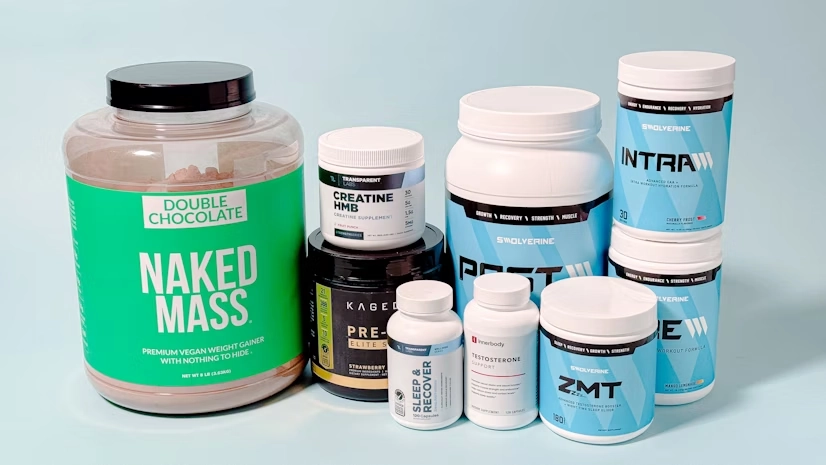
While you’ll find many supplements claiming to boost muscle growth, several popular options like CLA, testosterone boosters, glutamine, and carnitine have shown mixed results in studies.
Research on CLA suggests modest fat loss benefits but limited impact on muscle gains, while most testosterone boosters lack solid scientific backing.
Though glutamine and carnitine are sometimes marketed as muscle builders, current evidence doesn’t strongly support their effectiveness for muscle growth in healthy individuals.
i. Conjugated Linoleic Acid (CLA): As research continues to explore muscle-building supplements, conjugated linoleic acid (CLA) remains a controversial option among bodybuilders and athletes.
You’ll find many health and nutrition influencers promoting CLA as a natural muscle-building supplement, but the science tells a different story.
According to a thorough 2015 review, the effectiveness of CLA for muscle growth shows mixed results.
While it’s an omega-6 fatty acid that affects various bodily functions, there isn’t enough solid evidence to confirm its muscle-building benefits.
If you’re considering adding CLA to your supplement stack, you should know that its impact on muscle gains isn’t clearly established.
Before investing in CLA, you might want to focus on proven supplements with stronger scientific backing for muscle development.
ii. Testosterone Boosters: Testosterone boosters represent another category of supplements that’s gained significant attention in the muscle-building community.
While many products claim to enhance your testosterone levels naturally, it’s important to understand their actual effectiveness.
Popular testosterone boosters include D-aspartic acid, tribulus terrestris, DHEA, fenugreek, and ashwagandha.
However, research suggests these supplements primarily benefit individuals with clinically low testosterone levels.
If you’re already within a normal testosterone range and following a nutritionally sound diet, you mightn’t see significant results from these products.
Before considering testosterone boosters, focus on fundamentals like proper sleep, stress management, and balanced nutrition.
As Arnold would say, “The best gains come from consistent training and clean eating, not magic pills.”
If you suspect low testosterone, consult your healthcare provider for proper testing and guidance.
iii. Glutamine and Carnitine: Two popular supplements often marketed for muscle growth are glutamine and carnitine, though research indicates they’re less effective than many believe.
While glutamine plays a role in muscle cells and helps reduce oxidative stress during intense workouts, your body typically produces enough on its own if you’re eating a balanced diet.
As for carnitine, you won’t find much benefit if you’re young or middle-aged and already training regularly.
However, if you’re an older adult looking to support muscle growth, carnitine might offer some advantages. A 2020 study showed promising results for senior fitness enthusiasts, suggesting that carnitine supplementation could help maintain muscle mass during aging.
Even Arnold, in his later years, has acknowledged that supplement needs change as you age.
To Wrap It All Up
You’ve now got Arnold’s arsenal of supplements at your disposal, but remember – there’s no magic powder that’ll transform you into the Austrian Oak overnight.
While these supplements can enhance your gains, they’re just tools in your muscle-building toolkit. Keep crushing those workouts, fueling your body right, and staying consistent.
FAQs
1. Are There Any Bodybuilding Supplements That Actually Work?
Yes, several bodybuilding supplements actually work, including creatine, whey protein, caffeine, and beta-alanine. Creatine boosts strength and power, whey protein supports muscle repair, caffeine enhances performance, and beta-alanine delays fatigue. These supplements are backed by research and widely used by athletes for proven results.
2. What Is The No. 1 Supplement For Bodybuilding?
The No. 1 supplement for bodybuilding is creatine monohydrate. It increases strength, improves muscle endurance, and enhances recovery, making it the most studied and effective supplement for lifters. Daily doses of 3–5 grams are proven safe and highly effective for long-term use.
3. What Is The Best Supplement For Muscle Growth?
The best supplement for muscle growth is whey protein because it delivers fast-digesting amino acids that stimulate muscle protein synthesis. Consuming 20–40 grams after workouts maximizes repair and hypertrophy. Creatine and casein are also effective for supporting long-term muscle growth.
4. Do Bodybuilders Really Need Supplements?
Bodybuilders do not strictly need supplements if they meet nutrition goals through whole foods. However, supplements like protein powder and creatine offer convenience and performance benefits. They help fill dietary gaps but are not required for muscle growth when diet is balanced.
5. Are Supplements Safe for Beginners in Bodybuilding?
Supplements like whey protein, creatine, and multivitamins are safe for beginners in bodybuilding when taken at recommended doses. Beginners should avoid unregulated or stimulant-heavy products. Whole foods remain the foundation, with supplements used only to support training and recovery.
6. Natural vs Synthetic Supplements for Gaining Muscle – Which Is More Viable?
The main difference between natural and synthetic supplements for gaining muscle is the source. Natural supplements come from whole foods like whey, egg, or plant protein, while synthetic supplements are lab-made compounds like creatine monohydrate. Both can be effective, but natural options often provide added nutrients.

